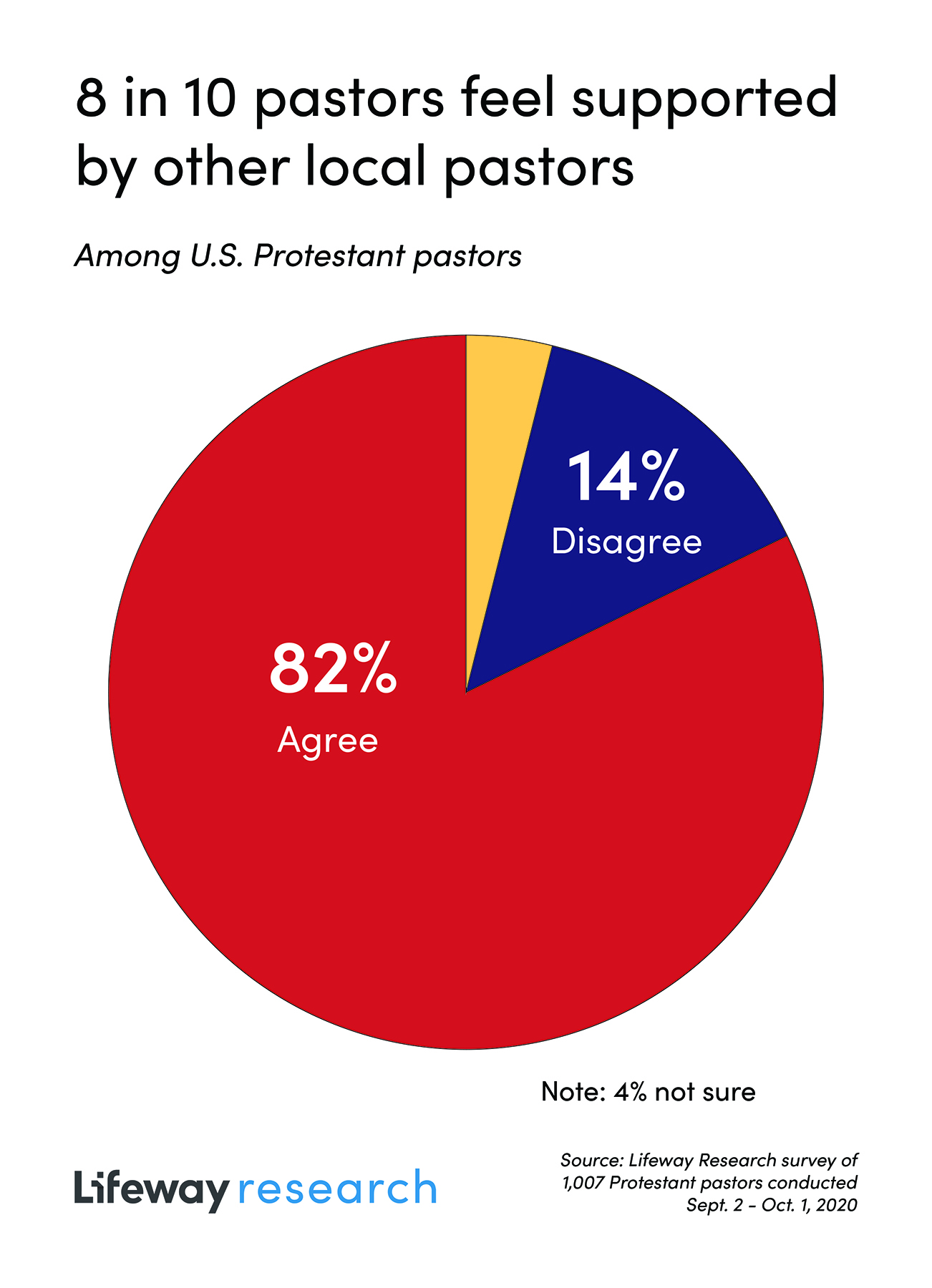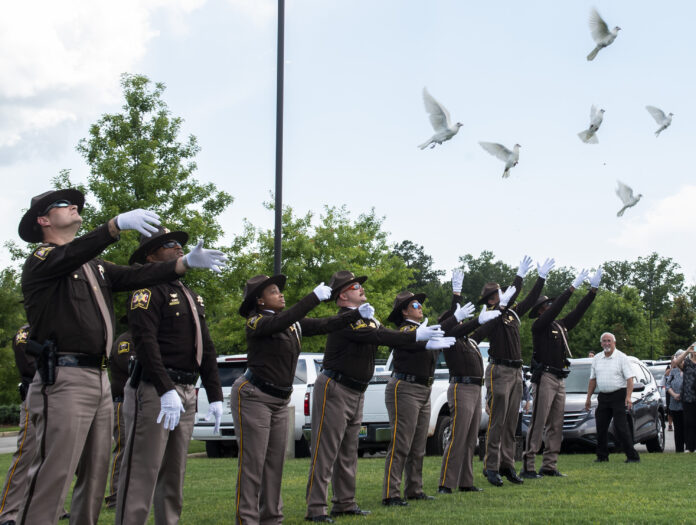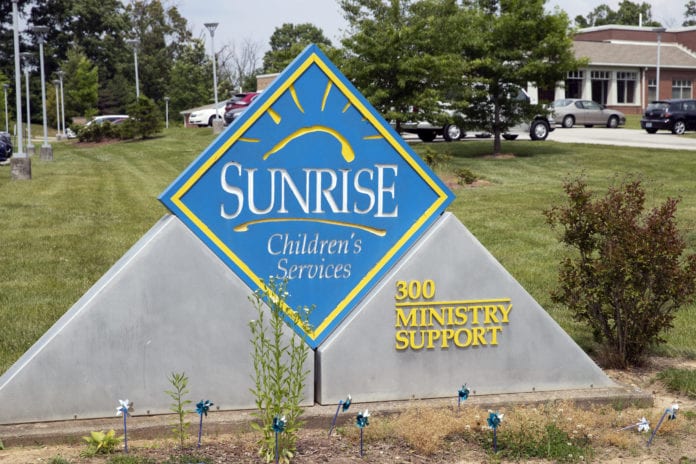UPDATED July 16, 2021: FRANKFORT, Ky. (AP) — Kentucky reached a contract deal Thursday to continue placing youngsters with a Baptist-affiliated children’s agency, coming after the Democratic governor’s administration removed LGBTQ anti-discrimination language that the agency steadfastly refused to sign.
The agreement continues the state’s long relationship with Sunrise Children’s Services, which provides foster care, residential and therapeutic services to children and families. It serves some of the most vulnerable children in a state with consistently some of the nation’s worst child abuse rates.
Those contractual ties had been jeopardized by a cultural clash pitting religious beliefs against gay rights. But on Thursday, the state Cabinet for Health and Family Services said in an email it entered into the new one-year contract agreement to continue placing children with Sunrise.
Sunrise’s attorney, John Sheller, said the agreement includes language protecting his client’s “sincerely held religious beliefs.” It reflects what Sunrise had requested, he said, adding the agency “is grateful that the commonwealth has decided to follow the law” after prolonged uncertainty.
Sunrise officials say the disputed nondiscrimination language would have compelled them to violate deeply held religious principles by sponsoring same-sex couples as foster parents. Sunrise is affiliated with the Kentucky Baptist Convention, consisting of nearly 2,400 churches. That faith views homosexuality as a sin.
Gay rights supporters said removing the LGBTQ-inclusive language would sanction discrimination.
Responding to the state’s decision to keep contracting with Sunrise, gay rights advocate Chris Hartman said: “It’s disappointing and disheartening that they would allow this discrimination to continue.” Hartman is executive director of the Louisville-based Fairness Campaign.
Kentucky Gov. Andy Beshear acknowledged recently that the state agreed to remove the LGBTQ anti-discrimination language from the contract following a U.S. Supreme Court ruling.
In the Pennsylvania case, the high court sided with a Catholic foster care agency that said its religious views prevented it from working with same-sex couples as foster parents.
Sheller had said the high court ruling applied fully to the Sunrise dispute, and warned if Kentucky failed to follow it, the state would “invite litigation which the governor is sure to lose.”
Hartman on Thursday disputed that the Supreme Court ruling had a direction application, and said gay rights advocates will keep pushing for the nondiscrimination language in state contracts.
“We’re going to continue conversations and continue advocating for no discrimination in any state-contracted services with anyone for any reason,” he said in a phone interview. “We don’t believe that state dollars should be utilized in the efforts of discrimination.”
Kentucky officials said Thursday that Sunrise agreed to refer any “service applicants who identify as LGBTQ to another provider in good standing” with the state’s health and family services cabinet.
Sheller previously said that Sunrise already offers to help steer same-sex couples to other child services agencies that are a “better fit.” Sheller has said that Sunrise “willingly and gladly” accepts LGBTQ youths and does not put children in conversion therapy, which tries to change a person’s sexual orientation or gender identity.
Like many other states, Kentucky contracts with private agencies like Sunrise for some of its child welfare services. Beshear’s administration had set a June 30 deadline for Sunrise to sign a new contract, threatening to stop placing children with the agency if it refused. But the governor said recently that children were still being placed with Sunrise.
Sunrise traces its roots to caring for Civil War orphans. It has contracted with the state of Kentucky for more than 50 years.
“Sunrise has been a place of refuge for hurting children since 1869, we are proud that we will now be able to continue to serve as needed,” Sunrise President Dale Suttles said Thursday. “We are ready to move forward and to be part of the solution in a dynamic way.”
The dispute has had political fallout. Kentucky Attorney General Daniel Cameron, a Republican, and GOP state lawmakers had pressed Beshear’s administration to renew Sunrise’s contract.
Responding to Sunrise’s new contract, Cameron said: “I’m glad to see the Beshear administration follow the law and do what governors of both parties have done for decades — work with Sunrise so that the organization can continue the important work of serving Kentucky’s children.”
By BRUCE SCHREINER Associated Press
AP original article written on July 14, 2021, below:
LOUISVILLE, Ky. (AP) — A cultural clash pitting religious beliefs against gay rights has jeopardized Kentucky’s long-running relationship with a foster care and adoption agency affiliated with the Baptist church that serves some of the state’s most vulnerable children.
The standoff revolves around a clause in a new contract with the state that bans discrimination based on sexual orientation and that Sunrise Children’s Services is refusing to sign.
It’s another round in a broader fight in states and the courts over religious liberty and LGBTQ rights, including whether businesses can refuse to provide services for same-sex weddings. An upcoming U.S. Supreme Court decision in a Pennsylvania case could be decisive in the Kentucky clash; it’s reviewing a refusal by Philadelphia Catholic Social Services to work with same-sex couples as foster parents.
In the Kentucky contract, Sunrise officials are concerned the disputed clause would compel them to violate deeply held religious principles by sponsoring same-sex couples as foster or adoptive parents. Supporters of the provision see it as a crucial safeguard against discrimination.
Child welfare advocates worry that losing Sunrise — which also offers residential treatment programs — would further strain a state system struggling to keep up with demand. Kentucky consistently has some of the nation’s worst child abuse rates.
“You cannot pivot from losing such a large provider of child welfare services … and not anticipate some degree of disruption,” said Terry Brooks, executive director of Kentucky Youth Advocates.
The state set a June 30 deadline for Sunrise to sign. If it refuses, the state has threatened to stop placing children with the agency. Formerly called Kentucky Baptist Homes for Children, Sunrise’s history dates to caring for Civil War orphans. It has contracted with the state for 50-plus years, becoming one of Kentucky’s largest service providers for abused or neglected children.
Sunrise’s supporters say the agency is the target of a political correctness campaign. Critics say allowing exceptions to the LGBTQ-inclusive clause would sanction discrimination.
“If Sunrise doesn’t want to abide by that, that’s fine. They shouldn’t have access to state money, state contracts or children in the state’s care,” said Chris Hartman, executive director of the Fairness Campaign, a Louisville-based gay rights advocacy group.
Hartman said he worries LGBTQ children in Sunrise’s care are “deeply closeted,” hiding their sexual orientation out of fear of “indoctrination and proselytization.”
A long-running federal lawsuit has alleged that Sunrise imposed religious indoctrination on children. Sunrise’s attorney, John Sheller, calls it an “outrageous accusation.”
Sheller said Sunrise “willingly and gladly” accepts LGBTQ youths and does not put children in conversion therapy, which tries to change a person’s sexual orientation or gender identity. Sunrise’s focus is on finding good homes for children and treating mental health, substance abuse or other problems they are battling, he said.
When same-sex couples contact Sunrise about becoming foster parents, the agency offers to help steer them to other child services agencies that are a “better fit,” Sheller said. He was aware of a handful of such instances.
“There is clearly a tension between LGBT issues and traditional Christian values,” Sheller said. “And it does not have to be winner-take-all. There is room for both principles to survive and thrive in our pluralistic society, and we can accommodate both.”
Kentucky’s Cabinet for Health and Family Services says it hopes for a “positive resolution.” Sunrise President Dale Suttles says he wants the relationship to continue.
“Sunrise would act on a contract today that allows them to care for Kentucky’s needy and abused children while protecting their deeply held religious beliefs,” said Todd Gray, executive director-treasurer of the Kentucky Baptist Convention.
Like many other states, Kentucky contracts with private agencies like Sunrise for some of its child welfare services. Overall, about 5,000 of the 9,100 children in Kentucky’s care are in foster homes or other placements managed by the state. About 4,000 receive care through private agencies.
Sunrise, which only operates in Kentucky, says it currently cares for nearly 800 children. The state reimburses Sunrise for about 65% of its costs, with private donations covering the rest.
The state insists it’s bound by an Obama-era federal rule to include the contract clause Sunrise opposes. The rule included sexual orientation as a protected class under anti-discrimination provisions.
“It would be a mistake not to place kids with wonderful couples that want to be foster parents that are gay,” Democratic Gov. Andy Beshear said this week. “People make wonderful foster parents in all types of couples, and we shouldn’t be eliminating or discriminating against any of them.”
Sunrise argues that the federal rule was invalidated under former President Donald Trump, giving the state leeway to exclude the clause. Sheller said the agency is “open to any reasonable process” as long as it’s “not compelled by that language to violate its faith principles.”
“The state’s position is that it’s going to try to compel Sunrise to sign the same form contract that it uses with secular providers,” Sheller said. “And Sunrise cannot and will not sign that form contract by July 1st or any other date.”
Sunrise is affiliated with the Kentucky Baptist Convention, consisting of nearly 2,400 churches with a total membership of about 600,000 people. The faith views homosexuality as a sin.
If Sunrise loses its state contract, it would have to change its model and raise new capital to continue its services, said Suttles, the agency’s president.
“We do know that there are many children in need of help that are not in state custody,” he added.
The dispute has had political fallout. Kentucky House Republicans and state GOP officials have urged Beshear’s administration to maintain ties with Sunrise. Republican Attorney General Daniel Cameron said the administration was forcing Sunrise to “choose between continuing to serve Kentucky children or abandon its religious beliefs.”
Meanwhile, other agencies contracting with the state welcome LGBTQ people as foster or adoptive parents.
“Gay-lesbian families want to grow their families just like heterosexual families do,” said Grace Akers, CEO of St. Joseph Children’s Home in Louisville.
She applauded Beshear’s administration for taking a stand she said will benefit children.
“There are children in Kentucky who are not just working through their trauma, but they’re working through who they are as gay, lesbian, bisexual or transgender,” Akers said. “And for us to celebrate those children, I just think is critical.”
If it cuts ties to Sunrise, the state must be prepared to fill the gaps if it loses some foster parents in the agency’s network, said Brooks of Kentucky Youth Advocates. His biggest concern is ensuring a smooth transition for the children who require “intense and specialized treatment” that Sunrise now provides.
Brooks said he’s confident the state can move children to other agencies but added that “the challenge cannot and should not be minimized.”
This article originally appeared here.



















